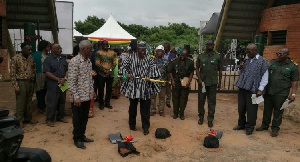 Dr. Alfred Sugri Tia holding the pick axe at at the sodcutting ceremony supported by Nii Osah Mills
Dr. Alfred Sugri Tia holding the pick axe at at the sodcutting ceremony supported by Nii Osah Mills
Deputy Minister for Environment, Science, Technology and Innovation, Dr. Alfred Sugri Tia, on behalf of President John Mahama, last Friday cut the sod for the commencement of the redevelopment of the Achimota forest reserve into an eco-tourism centre.
The president stated categorically that the Achimota Forest had not been sold but leased out to a private entity to add value to it and protect the vegetative cover which is being lost to encroachers.
The construction of the $1.2 billion Accra Eco-Park by the Forestry Commission and its private partner, Aikan Capital Limited, is expected to change the city of Accra and make it a major tourism destination in the West African sub-region.
First phase of the project – in the city’s only green belt – will be completed within 24 months while the whole project will take about seven years to complete.
The Accra Eco-Park project, a public-private partnership (PPP), when completed, would add to the country’s major national parks like Kakum in the Central Region and Mole in the Northern Region.
Aikan Capital, under a lease agreement, will design, build and operate the facility for 10 years, its Chief Executive Officer, Oheneba Yaw Otchere, disclosed.
He said the project makes room for the planting of more than two million trees to enhance the forest cover.
Mr Oheneba Otchere said the lease agreement would allow them to develop a world-class eco-tourism infrastructure based on the concept of an eco-theme park involving the introduction of selected wildlife safaris, amusement park, eco-lodges spiritual enclave and a cultural village.
The forestry commission will receive about 20 percent of the revenue generated, while government will receive revenue amounting to about $186 million as corporate tax, $15 million as PAYE and about $18 million in social security payment.
Some Products & Services
The eco-park will see also the construction of orchards, arboretum, museums and eco-commercial enclaves but with little disruption in the natural vegetation as possible.
It will also have a spiritual enclave to cater for spiritual/worship activities that bring more than 180,000 people annually to the Achimota Forest.
Apart from the recreational facilities, the development partners have plans for conference rooms with high seating capacities targeted at corporate bodies. They will be sited outside the main forest area.
Project Delay
The development of the eco-park should have started earlier in the year but was put on hold because of a legal action brought against the developers.
Four Ghanaians went to court insisting that the deal would harm the environment and pose health and other risks to residents of Accra; but the case has been settled amicably and the project is now ready to take off.
Job Creation
The deputy environment minister said the project would create countless jobs for the youth and generate revenue for the country.
“Apart from making the city of Accra a world-class recreational area, the project will offer numerous benefits and have a multiplier effect in job creation.
“It will create about 4,000 jobs during the construction phase. These will include draughts men, plumbers, civil engineers, welders, masons, architects, electricians, planners, surveyors and many others, who will receive more than $200 million in income over a ten-year period,” he said.
Dr. Sugri Tia said during the operational phase, more than 2,000 direct and 10,000 indirect jobs would be created.
“This will include tour guides, caterers, drivers, accountants, managers, ecologists, mechanics, engineers, security personnel and numerous business opportunities. These are mostly jobs that our artisans and labour force have the requisite skills to be profitably engaged in,” he asserted.
Nairobi National Park Example
Nii Osah Mills, Minister of Lands and Natural Resources, said the success stories of both the Mole National Park and other foreign examples such as the Nairobi National Park in Kenya, had demonstrated the enormous socio-economic potential in the non-consumptive use of the forest and wildlife resources.
This, he said, had necessitated a paradigm shift from the dependency on timber to exploring innovating interventions to optimize the socio-economic benefits of wildlife based on non-consumptive use, while enhancing the ecological integrity of the forest ecosystems.